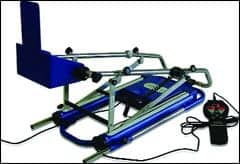The Centers for Medicare & Medicaid Services (CMS), Washington, have announced a proposed 2.2% home health market basket update to the home health prospective payment system (HH PPS) rates for calendar year (CY) 2010, according to a statement on the CMS Web site.
As part of ongoing efforts to address potential fraud and abuse with regards to outlier payments under the HH PPS, CMS is proposing modifications to its outlier policy.
Home health agencies (HHAs) receive additional payments (outlier payments) for 60-day home health episodes of care that carry unusually high costs. CMS proposes to cap outlier payments at 10% per agency and target total aggregate outlier payments at 2.5% of total HH PPS payments. Currently, the target for outlier payment targets is 5% of total HH PPS payments. As such, CMS reduces home health rates by 5% to fund outlier payments. By lowering the total outlier payment target to 2.5% of total HH PPS payments, CMS would increase home health rates by 2.5%.
In the rule, CMS maintains current policy with a proposed 2.75% reduction to the national standardized 60-day episode payment rates and non-routine medical supply factor in CY 2010 to offset for an increase in home health case-mix that is not associated with any underlying change in the actual clinical condition of home health patients. This reflects the third year of a 4-year phase-in of adjustments to HH PPS rates, which were finalized in the HH PPS Refinement and Rate Update for CY 2008 final rule.
Home health payment rates have historically been updated annually by either the full home health market basket percentage, or by home health market basket adjustments from Congress. CMS uses the home health market basket index, which measures inflation in the prices of an appropriate mix of goods and services offered by home health services. Section 5201(c) of the Deficit Reduction Act of 2005 (DRA) provided for an adjustment to the home health market basket percentage update for CY 2007 and subsequent years depending on quality data submissions by HHAs.
The rule also proposes to reduce Medicare’s vulnerability to fraud, abuse and improper payments. The rule proposes to add payment and enrollment safeguards to improve the enrollment process and the quality of care that people with Medicare receive.
Currently, HHAs are required to collect and report Outcome and Assessment Information Set (OASIS) data, the quality information currently required under the Medicare Home Health Conditions of Participation and pay for reporting. At discharge, transfer and various time points in the course of home health care, OASIS data is collected and translated into outcome measures that reflect the performance of home health agencies in their care of patients. OASIS data can help physicians and other home health professionals identify early warning signs of diseases, such as diabetes. Documentation could cue questions and concerns about patient health, encourage preventive care or additional patient treatment reporting, including recording any immunizations and vaccinations that patients receive.
The proposed regulation requires home health agencies to submit OASIS data as a condition for payment under the HH PPS. CMS proposes adding a new version of OASIS, called OASIS-C, to collect data on all episodes of care beginning on or after January 1, 2010. CMS posts the nationally accepted and approved quality measures on the Medicare Web site.
For CY 2010, under the proposed rule, CMS will evaluate home health care quality by continuing to rely on the submission of OASIS assessments and publicly report the 12 nationally accepted and approved quality measures through the [removed]CMS Home Health Compare Web site[/removed]. HHAs that submit required quality data will receive payments based on the full proposed home health market basket update of 2.2% for CY 2010. The proposed home health market basket percentage would be reduced by 2 percentage points to 0.2% for CY 2010 for those HHAs that do not submit the quality data.
For CY 2011, CMS proposes to expand the home health quality measures reporting requirements to include the Consumer Assessment of Healthcare Providers and Systems (CAHPS®) Home Health Care Survey.
To qualify for the Medicare home health benefit, a Medicare beneficiary must be under the care of a physician, and have an intermittent need for skilled nursing care, need physical or speech therapy, or continue to need occupational therapy. The beneficiary must be homebound and receive home health services from a Medicare approved HHA.
[Source: CMS]




